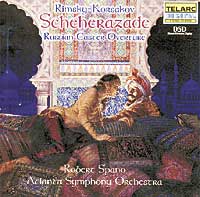Brooklyn Philharmonic conductor Robert
Spano will also assume the reins of the Atlanta Symphony Orchestra
this fall, putting the maestro in the enviable position of simultaneously
running two of America’s most up-and-coming orchestras.
But those of us local Spano fans who won’t be able to get to
Georgia can still hear how Spano and his Atlanta musicians work
together, thanks to the release of a superior Telarc recording
of two works by Russian composer Nikolai Rimsky-Korsakov.
There’s no doubt Spano and the Atlanta Symphony took a chance
by beginning their studio collaboration with Rimsky-Korsakov’s
ubiquitous symphonic suite "Scheherazade," not only
because of its familiarity to even the most casual classical
listener, but also because of the brilliant sheen of its orchestration
and the intricacy of its solo sections.
Spano and the Atlantans, however, do "Scheherazade"
proud. Composed in 1888 (as was the "Russian Easter Overture,"
also given a spiffy presentation here), "Scheherazade"
remains Rimsky-Korsakov’s most recognizable and popular work.
Spinning several tales from "1001 Arabian Nights,"
the composer’s canny genius for layering the complexities of
the symphony orchestra takes center stage, with the storyteller
represented by a most eloquent and gentle solo violin.
On this recording, the orchestra’s principal violinist Cecylia
Arzewski melodiously plays the deceptively difficult solo part.
And Spano builds the right amount of tension, as the music heaves
and sighs between the Sultan’s murderous gestures toward Scheherazade
and her successful attempts at staving off death with another
involving tale. The music culminates in a peaceful melding of
both characters’ themes, the tales finished for the night.
Local audiences have known for some time that Spano can make
beautiful music with the Brooklyn Philharmonic. This recording
proves – perhaps to our chagrin – that he can do the same elsewhere.
(Telarc, $16)
Bargemusic listening
Audiences attending Bargemusic concerts encounter composers they
may be unacquainted with, always a healthy sign for an art form
trying to remain alive and vital. By happy coincidence, several
new CDs containing music by these composers are worth hearing
as either a preview before the concert or a further investigation
afterward.
Frenchman Ernest Chausson (1850-1899), who missed the 20th century
by a few months when he died in a freak bicycle accident, wrote
sublime chamber music of high refinement; his "Piano Trio
in G minor" will be heard Aug. 16 and Aug. 19 featuring
pianist Wendy Chen.
But Chausson was best as a writer of "melodies" (songs),
very nearly the equal of fellow countryman and contemporary Gabriel
Faure, which puts him on equal footing with the great German
lieder composers Franz Schubert, Robert Schumann and Hugo Wolf.
A new two-disc Hyperion recording is misleadingly titled "The
Complete Songs of Ernest Chausson," since there are actually
a few missing. But there’s no quibbling with the uniformly excellent
performances of these 43 exquisitely constructed songs.
Baritone Chris Pedro Trakas brings a hefty and agile voice to
several of Chausson’s most perfect vocal miniatures, such as
"L’Albatros" and "Apaisement." Soprano Felicity
Lott lovingly caresses a quintet of jewels, the cycle "Serres
Chaudes," and mezzo Ann Murray gives the remarkable "Chanson
Perpetuelle" – scored for a string quartet – a most delicate
texture. Pianist Graham Johnson is the perfect accompanist throughout.
(Hyperion, $38)
When Heitor Villa-Lobos died in 1959 at age 72, the Brazilian
composer left behind several hundred works, including operas,
orchestral pieces, chamber works and assorted vocal music. His
eclecticism served him well, since he adroitly merged Western
styles with the indigenous sounds of his native country. (The
Aug. 3-4 Bargemusic concerts showcase his dazzling originality
with a rare performance of his "Jet Whistle for Flute and
Cello," with flutist Julia Scolnik and cellist Bion Tsang.)
Among Villa-Lobos’ 17 string quartets are some of the most dramatic
and original contributions to the genre since those of Bela Bartok.
Dorian Recordings has just released the sixth and final disc
in its complete set of Villa-Lobos’ quartets, and as with the
previous five CDs, the musicians in the Cuarteto Latinoamericano
play these stunning works with the passion and authority they
deserve. (Dorian Recordings, $18).
A lover of Bach’s music, Villa-Lobos paid the ultimate musical
compliment to a past master with his series of nine "Bachianas
Brasileiras" – works that weld Bach’s baroque forms to 20th
century Brazilian rhythms and melodies. A superb three-disc set
from Iris Music collects all of these seminal works, played by
the Orchestre Symphonique du Bresil under Isaac Karabtchewsky.
Bachianas Brasileiras No. 5 is the best known – its beguiling,
wordless melody is sung here by soprano Leila Guimaraes – but
No. 3 (for piano and orchestra), No. 6 (for flute and bassoon)
and No. 9 (for string orchestra) show Villa-Lobos himself as
a musical master of an endless variety of styles. (Iris Music,
$54)
The Bargemusic program featuring Villa-Lobos’
"Jet Whistle for Flute and Cello" is Aug. 3 and Aug.
4 at 7:30 pm and the Chausson "Piano Trio in G minor, Op.
3" is Aug. 16 at 7:30 pm and Aug. 19 at 4 pm. Tickets are
$30, $25 seniors and $15 students. Bargemusic is on the East
River at Fulton Ferry Landing, south of the Brooklyn Bridge overpass.
For more information call (718) 624-4061 or visit www.bargemusic.org.

























